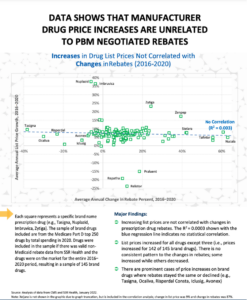The evidence is clear: prescription drug rebates negotiated by pharmacy benefit companies with drug companies are not correlated with drug list prices, which are set solely by drug companies.
A recent analysis using Centers for Medicare and Medicaid Services (CMS) data of the top 250 brand-name drugs in Medicare Part D by total spending in 2020 confirmed that price increases from big drug companies are unrelated to rebates.
Key findings in the analysis include:
- Increasing list prices are not correlated with changes in prescription drug rebates.
- There is no consistent pattern to the changes in rebates; some increased while others decreased.
- There are prominent cases of list price increases on brand drugs where rebates stayed the same or declined.
See the infographic below:

Additionally, rebates result in significant savings for patients. 99.6 percent of rebates are passed directly to Medicare Part D plans and 91 percent to other health plan sponsors, like employers and unions, who use those savings to help patients, including by lowering premiums, reducing cost-sharing at the pharmacy counter or providing more comprehensive benefit offerings.
What do Pharmacy Benefit Companies do with Rebates?
During a recent U.S. Senate Health, Education, Labor and Pensions (HELP) Committee hearing, three pharmacy benefit company executives confirmed they pass on the vast majority of rebates in their testimony.
David Joyner, Executive Vice President, CVS Health and President, CVS Caremark:
“Today, we pass more than 98 percent of all the rebates back to our clients. We also provide them with regular detailed updates on drug spending and utilization, prescription claims process, cost savings achieved and also the manufacturer rebates that we receive.”
Heather Cianfrocco, Chief Executive Officer, Optum Rx at UnitedHealth Group:
“Overall, we deliver, on average, $1,600 in annual drug savings per person to our customers. 98 percent of our negotiated discounts passed directly to our customers, and they use these discounts to help reduce premiums, to provide point-of-sale savings and to invest in health and wellness programs.”
Adam Kautzner, President, Express Scripts:
“Rebates have been characterized by some as the mechanism for increase in list prices and thus increase in cost for patients. This claim is false, rebates are discounts we negotiate to lower prices. More than 95 percent of our rebates are passed to Express Scripts clients, which benefits Americans in the form of lower premiums, reduced out-of-pocket costs and expanded coverage.”
Rather than targeting pharmacy benefit companies and the rebates they secure that result in savings, lawmakers should focus on addressing the root cause of high drug prices – big drug companies’ abuse of the patent system, which keeps more affordable alternatives from entering the market so drug companies can increase prices at the expense of American patients and families.
__________________________________________
See the infographic on how high drug prices set by big drug companies are unrelated to rebates HERE.
Read PCMA’s recent blog also showing that rebates have no correlation to high drug prices set by Big Pharma HERE.
See PCMA’s guide to understanding the role and value of pharmacy benefit companies HERE.
###
PCMA is the national association representing America’s pharmacy benefit companies. Pharmacy benefit companies are working every day to secure savings, enable better health outcomes, and support access to quality prescription drug coverage for more than 275 million patients. Learn more at www.pcmanet.org

